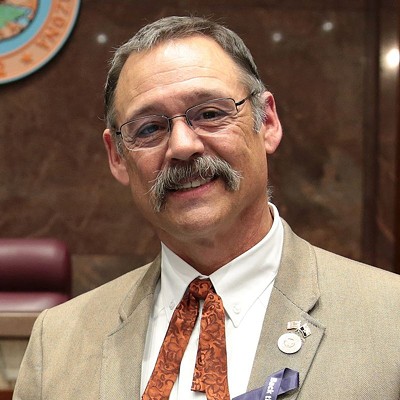But who would know?
In his financial blueprint for the upcoming fiscal year that begins July 1, County Administrator Chuck Huckelberry is telling his five-member Board of Supervisors that there are no worries.
Huckelberry kicked out a four-volume recommended budget Thursday, May 18, and then split for his Puerto Peñasco retreat beyond the border. It didn't matter that books, reserved for the dailies and the television talking heads, went untouched. Huckelberry also supplied a guide, including a one-page list of highlights, that netted overwhelmingly positive reviews.
With Charles in charge, supervisors seeking re-election will be able to spend more--$842 million instead of the current $779 million--and boast that they eliminated a once insurmountable debt, provided more cops, gave big raises for those sheriff's deputies and jail guards, gave automatic raises for all other county employees, did not increase taxes, and even added some more court space.
Supervisors began hearings on the budget this week and are scheduled to set a spending limit on July 17. Final adoption is set for August 14 and the tax rate is set for August 21, two weeks before the primary election. Only Republican Mike Boyd is not seeking re-election.
All the figures present a picture that is too good to be true, at least for the main watchdog group, the Pima Association of Taxpayers.
"It's an election year budget," said Ken Marcus, president of the group. "It is precarious even in economic boom times. They talk about growth but they raised taxes on all of us last year to be able to be able to afford this."
And if county budgets, as some county supervisors proclaim, show that growth has not paid for itself over the last decade, the ongoing construction boom sure the hell has bailed the county out of a debt that grew to nearly $57 million just 10 months ago.
"It has helped if you take the microscopic view," Huckelberry said in an interview. Still, he is pushing to diversify the revenue base with a half-cent sales tax.
Not only are supervisors being propped up to wipe out a $45 million debt built mostly in the county's health and medical services units, but also a $30 million loan to the county's general fund from Waste Water Management. That essentially moved money from one county pocket to another to cover deficts and allow the county to pay daily bills in 1999. Money from property taxes will have to repay Waste Water, which derives its money from sewer fees and hookup charges.
Supervisors adopted a plan last year to erase the debt over three years. Increased tax revenue, Huckelberry says, will enable a two-year payoff.
The new money came via a third-straight tax increase. Only Ray Carroll, a Republican who has been the holdout to the county's ability to levy a half-cent sales tax because it requires a unanimous vote, voted against the biggest of those increases. That was an 11 percent increase last year that meant $32 a year for the owner of a $100,000 home, but $96 for the owner of a $100,000 business property. But even Carroll, who represents the tax-sensitive retirement hamlet of Green Valley, voted to increase property taxes the year before by a smaller margin, one that meant an extra $10 for his Green Valley constituents who own $100,000 homes.
The county's total net assessed value--the value of property used to compute the county's take in property taxes--grew by 5.41 percent to $4.06 billion. And, as shown by preliminary data from Democratic County Assessor Rick Lyons, nearly 75 percent of that increase is "attributable to new construction rather than increased valuations" of existing homes and other buildings.
That, combined with the county's record-level primary property rate of $4.07 per $100 of assessed value, has created a huge windfall for the county. Indeed the projected fund balance when the fiscal year ends June 30 is $18.8 million--a whopping $14.8 million more than the $4 million Huckelberry and his staff projected. Next year's balance is based on an optimistic 96 percent collection rate.
The county debt arises primarily from the county's $200-million-a-year health system, and the bulk of that debt, both in long-term and yearly operating deficits, is from the 23-year-old Kino Community Hospital. Kino's share topped $40 million in January. Reforms and new management, Huckelberry says, will put Kino in the black next year for the first time since 1992.
But Huckelberry is leaving supervisors to find a way to stop compounding Kino's debt. Taxpayers are now covering Kino's institutional and longstanding inability to collect for the services it provides. Repeated audits have shown Kino has not billed health plans, insurers and state and federal indigent health plans, including the Arizona Health Care Cost Containment System and Medicare. That means that county taxpayers pay twice or three times for services for the indigent: taxes go to the state and federal health plans, Kino provides services that go unbilled, and taxpayers have to pay again to erase the debt. At least $5 million is needed for capital improvements at Kino and to implement a billing overhaul.
Raises for the 720 Kino employees also will be left for supervisors to decide. Deputies, meanwhile, will get 7.5 percent increases costing taxpayers $4.1 million. Jail guards will get 5 percent increases, costing nearly $2.5 million. Others within the 7,500-person county workforce will get automatic 2.5 percent increases, under the Huckelberry plan.
HUCKELBERRY'S PLENTY-for-everybody strategy has everyone happy except County Attorney Barbara LaWall, a Democrat who is seeking a second term. LaWall has cried that a $2 million increase in spending, to $27.4 million, is not enough.
That has set off renewed debate on a number of cases she insists on taking to trial rather than resolving through plea bargains. And her battle with Huckelberry and the Board of Supervisors also highlights the conflict of interest her office sidesteps during each budget battle. LaWall's civil division provides counsel to Huckelberry and all county departments as well as to the Board of Supervisors.
LaWall's insistence on one civil case, that of Amphitheater School Board member Ken Smith, illustrates her spending priorities. She and her schools attorney, Paula Wilk, claimed they had no choice but to go to court to seek Smith's removal from the Amphi Board under a state law that says school board members can't serve while their spouses are working for the district. Smith's wife retired as an Amphi teacher in 1996, and as part of the district's retirement program was required to work in a variety of capacities, including tutor, on 20 days a year.
The Smiths fought back and won when Superior Court Judge Kenneth Lee said Barbara Smith was not an Amphi employee. But seeking to avert the protracted court case, Smith's lawyers, Bill Risner and Anthony Ching, offered a solution at the outset of the case in November. They proposed that Barbara Smith not work any more days in the early retirement program.
That brought this response from LaWall: "This office cannot bargain or negotiate with required duties under the law or with the rights of the electorate. Unless it is clear that there is no employment relationship, creating a mandated duty on the part of the County Attorney to file an action pursuant to (Arizona law), this office will have to perfom its duty under the law."
Smith, incidentally, won by a landslide in 1998, taking all but three of Amphi's 51 voter precincts.
Wilk, whose annual salary is $70,728, says other job duties--including reviewing a stack of county contracts--prevented her from providing The Weekly with a total of her hours, as well as the cost of paralegals and secretaries who worked on the Smith case. But she was in court for three days for at least six hours and filed numerous pleadings and court memoranda.
Lee also ruled that Smith was entitled to legal fees, capped at $10,000. That money will come out of LaWall's tax-funded budget.
KINO IS NOT alone in building the county debt. The county's $36 million major-league spring training complex that includes the home of the AAA Tucson Sidewinders will be nearly $5.8 million in the red by June 30. The county's recycling program is running up a $1.2 million deficit this year, on top of the county's landfill operations deficit of $440,000.
This operational debt is separate from the debt that is to be incurred and discharged annually in bond sales for projects that county voters overwhelmingly approved in May 1997. A record $712 million in bond projects was approved, including street, sewer and parks improvements, open-space acquisition and the new Juvenile Justice Center.
Despite the surge in property tax revenue, Huckelberry is returning to his pet push: implementation of a half-cent sales tax that could raise between $44 million and $48 million a year.












